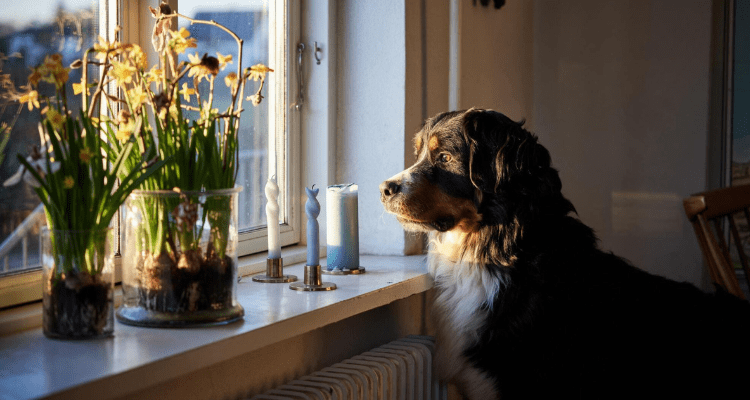Dogs love it when they have their humans always around them. This is because they are pack animals, and they always need someone to bond with. Most dogs experience a behaviour issue called separation anxiety, where they indulge in destructive behaviours like barking, digging, howling, etc., on being left alone by their parents.
If you are a first-time dog owner, here is a handy guide that will help you to keep your dogs calm and peaceful when you are stepping out of the house.
How to Tell If My Dog Has Separation Anxiety?
Some common signs indicate separation anxiety in dogs. Here are those,
- Excessive barking, howling, or whining when you step out of the house
- Indulging in behaviour like chewing your furniture, digging, or scratching your door.
- Drooling or panting heavily
- Urinating or defecating inside your house
- Trying to get out of the house to find you
5 Highly Effective Tips to Prevent Separation Anxiety in Dogs
1) Keep Your Goodbyes Low-Key
For the first few months, avoid kissing or hugging your dog each time you leave the house. Keep things low-key, by stepping outside of the house for a few minutes and slowly leaving without them noticing. This is also called “gradual desensitisation”, where your dogs slowly learn to accept your absence and don't become anxious. Regularly practising this technique makes your dogs not associate your departure with stress.
2) Tire Your Dog Before Going Out
A tired dog is a peaceful dog. Before leaving your house, play a game of fetch or go for a long walk with your dog to burn off their pent-up energy. When your dog is tired, they become completely relaxed helping them to doze off quickly. Also, each time you go for a walk, your dogs get a sense of confidence, which makes them feel secure in their surroundings and cope better in your absence.
3) Give Them Their Favourite Toy or Treat
This is one of the best methods to keep your dogs well-behaved. Mental stimulation is as important as physical activity and for this, you can give your Fido an exciting dog toy. When your dog is engaged in playing, they are more likely to ignore your absence. Another method to keep them happy is by offering them delicious dog treats. Treats act as a great incentive for your dogs to be well-behaved and you can reward them every time they are silent when you come back home.
4) Create a Safe Space For Them
Having a space that your dogs can call as their own boosts their morale tremendously. You can buy them a dog crate, which creates a den-like environment to make your dogs feel secure. This sense of security is more likely to keep the dogs calm when you leave the house. To make your dogs adapt to their crate quickly, place their favourite dog treat or toys inside.
5) Seek Professional Help If Needed
Sometimes, it’s beyond dog parents to cure specific behavioural issues in their dogs. This is where you can take the help of certified trainers. They are very well adept at the subtle signs of discomfort in dogs and will help you in eliminating undesirable traits in them. You can also seek the help of your vet to get calming supplements that provide a relaxing effect to dogs.
Dealing with separation anxiety in dogs requires a tremendous amount of patience. Some dogs will take a bit more time to learn and you need to slowly teach them with love and care. The above tips will help you significantly reduce the fear of loneliness in your dogs.

